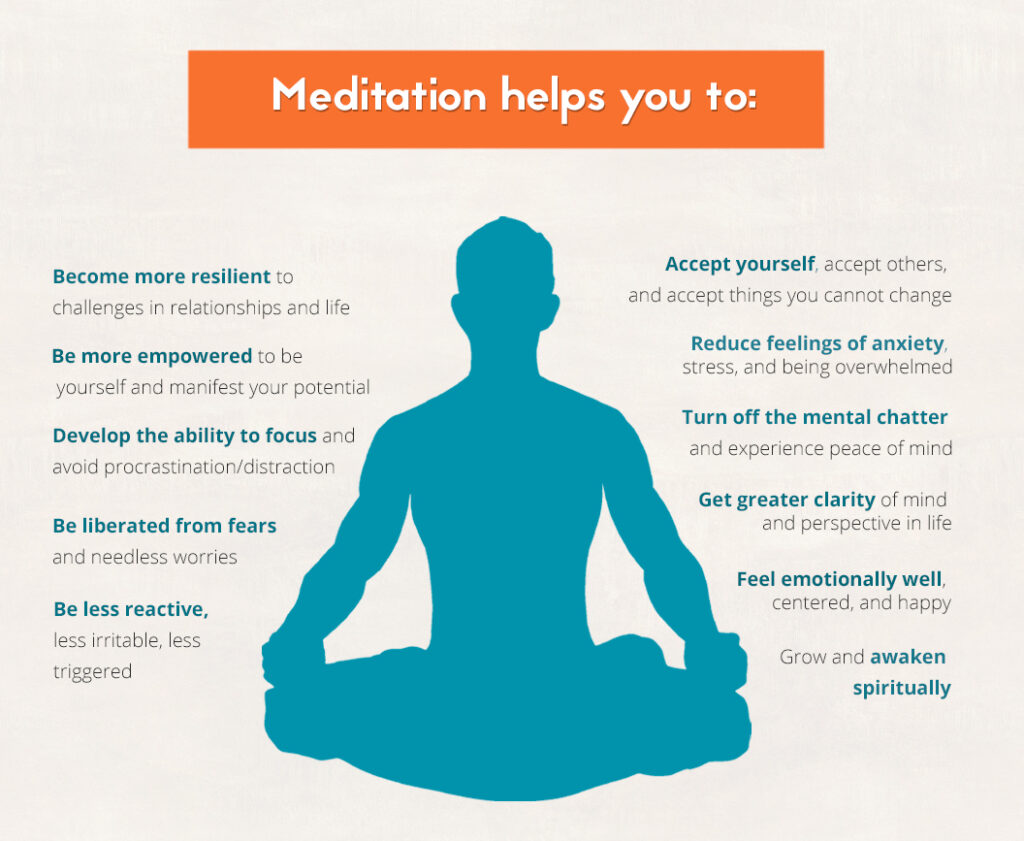There is a very long list of health benefits of meditation. However, here are just a few significant health areas that affect the masses.
1. Stress and Anxiety Relief
The proven health benefits of meditation are becoming more apparent here in the western world. However, other cultures have practiced meditation and reaped the health benefits for thousands of years.
Meditation teaches us to let go of the stressors that are not in our immediate reach. Therefore, we learn how to focus on the things that need our attention at the moment.
Overwhelming long bouts of stress and anxiety flood our bodies with harmful stress hormones cortisol and adrenaline. When we are in a state of fight or flight response for long periods, these stress hormones wreak havoc on our minds and body. As a result, research shows that 90% of all health issues are stress related, physically, mentally, and emotionally. Meditation teaches us to handle stress and anxiety in healthy ways, leaving us feeling calm, centered, and focused. Therefore, meditation teaches us how to deal with the high stressors that come up in life.
Research Studies on Transcendental Meditation: health benefits of meditation
Recent research studies analysis on the randomized controlled trial on Transcendental Meditation (TM) with populations that suffer from elevated anxiety in the 80 to 100 percent range. Patients with chronic anxiety and post-traumatic stress disorder of veterans and prison inmates. This population showed the most promise, with anxiety levels reduced from 53% to 62%.
2. Effects of Meditation On The Body
Elevated anxiety and poor mood are linked to the increased chance of an illness and disease manifesting. In addition, today, issues in our world have increased individual and family stressors. As a result, suffering from stress and anxiety is one primary reason most individuals start a meditation practice. Meditating with the customary process of training your mind to focus can redirect your thoughts away from stress triggers.
Health Benefits of Transcendental Meditation:
Scientific studies show that Transcendental Meditation is more effective than usual treatments, and most alternative therapies are available. In addition, research studies show meditation repeated measures showed substantial stress reduction in the first two weeks. As a result, transcendental Meditation studies show that individuals with the highest stress and anxiety levels benefited the most from this practice.
3. Emotional Health Improves: health benefits of meditation
The Health Benefits of Mindfulness: meditation promotes emotional health by improving self-image; as a result, individuals experience a more positive outlook on life. Eighteen studies reveal people who practice meditation experienced a decrease in depression symptoms compared to others in the control group. In addition, mindfulness meditation practiced by over 3,500 individuals reported improvement in their depression symptoms.
Cytokine chemicals (inflammatory chemicals) are released in the body by stress. These chemicals also affect our mood and lead to depression. Lowering these harmful chemicals in the body reduces depression symptoms and other inflammatory health issues.
4. Self-Awareness:
Self-inquiry meditation helps develop a greater understanding of yourself and your relationship with those around you. Therefore, this meditation can help you build on your ability to redirect negative thoughts and maintain focused attention. Research also reveals how meditation can reverse patterns in the brain that contribute to mind-wandering, poor attention span, and worry. The research study concluded that practicing meditation for eight weeks daily for as little as 13 minutes enhances attention span and memory.
5. Age-Related Memory Loss:
Kirtan Kriya meditation also has science-based healing benefits. Kirtan Kriya is from the Kundalini yoga tradition. In the Eastern tradition, Kriya meditations have been practiced for thousands of years. Kriya meditation help brings the body, mind, and emotions into balance, enabling the mind and body to heal. Clinical research has shown that practicing Kirtan Kriya for just 12 minutes a day can improve cognition and activate the brain central to memory. In addition, Kirtan Kriya mediation helps individuals with Alzheimer’s and other types of dementia.
Isha Kriya meditation by Sadhaguru of the Isha Foundation.
How to practice:
- Sit in a cross-legged posture, with the spine comfortable erect; if needed, use a backrest but no headrest.
- Doing the Kriya facing east offers extra benefits.
- Keep your hand upon your thighs, with your palms facing upwards.
- With your face slightly upturned eyes closed, keep a mia soft focus between your eyebrows.
The meditation happens in three stages:
Stage 1
- Inhale and exhale gently and slowly.
- With each inhalation, mentally say to yourself, “I am not the body.” The inhalation should last for the whole duration of the thought.
- With each exhalation, Mentally say to yourself, “I am not even the Mind.” Therefore, the exhalation should last for the whole duration of that thought.
Repeat for 7 to 11 minutes.
Stage 2
- Utter the sound “Aaa” 7 times with mouth wide open, exhaling fully into each sound.
- Note: The sound should come from just below the navel. You need not utter it very loud but loud enough to feel the vibration of the sound.
Stage 3
- Sit for 5-6 minutes with a slightly upturned face, and keep a soft focus of your eyes between your eyebrows.
- The total time of this practice is between 12- 18 minutes. However, you can sit longer if you wish.
Please Note:
- When you sit to do Isha Kriya, ignore the activity of the mind or body. Thoughts that come up let them pass by, focusing on the meditation. Sensations in the body pay no attention. So, ignore whatever happens in your body or mind and sit there.
- Please do not take a break in between, as it will disturb the reorganization of energies during practice.
- The Kriya will yield maximum benefits if you:
- Please do it for a minimum of 12 minutes each time.
- Do it twice a day for 48 days.
- Considered as an entire mandala or cycle or once a day for 90 days.
Anyone can practice this Kriya and enjoy its benefits. Follow the instructions without making any changes.
You can remind yourself, “I am not the body; I am not even the mind,” anytime throughout your day.
Meditation for Caretakers-Balancing Mind and Emotions
Caretakers are always taking care of others, and their lack of time and energy leaves very little for taking care of themselves. Caretakers of all types can benefit from meditation. Many types of meditation help balance the mind and emotions of individuals in caretakers’ roles. Individuals need to find the proper technique that is perfect for them. Studies also provide evidence that meditation-based interventions improve the levels of depression and burden for the caregivers of dementia family members.
6. Improves Sleep: health benefits of meditation
The major causes of insomnia are racing or runaway thoughts. Individuals with insomnia can benefit from meditation, which helps relax the body. Releasing tension in the body also puts the mind at ease. Meditation at bedtime helps people with insomnia into a more peaceful state. They enable the body to reach a deeper state of relaxation. As a result, individuals fall asleep and stay asleep longer without disturbance.
7. Effects of Meditation on the Body: Pain Control With Mindfulness-
Health Benefits of Mindfulness Meditation:
A research study with nearly 3,500 participants concludes that meditation is associated with decreased pain levels. Individuals who suffer from pain and meditate are more remarkably able to cope. Therefore chronic pain sufferers can achieve a reduction in their pain senses. Thirty-eight studies concluded that mindfulness meditation could reduce chronic pain. In addition, many individuals reduced their pain medication or stopped it together. As a result, they are improving their quality of life along with decreased symptoms of depression.
Mindfulness meditation can also be beneficial in helping individuals with addiction problems.
8. Lowers Blood Pressure:
Countless research studies show meditation helps to control blood pressure by relaxing the nerve signals that coordinate heart function. In addition, it is easy to practice breathwork. Just sit and relax and take some deep relaxing breaths in and out, calming the mind and body. Therefore, relaxing blood vessel tension and the “fight-or-flight” response increase alertness in stressful situations.
9. Present Moment:
We are sitting and focusing our minds on what we are doing now. Not upset about yesterday or worried about what may happen tomorrow. We learn to focus our thoughts on what we want to focus on.
As a result, we learn how to keep our emotions in check by not letting our minds control our actions. Instead, we take control of our minds. Meditation establishes a secure connection between our internal and external worlds. Peacefulness becomes part of our outer world as we evolve in harmony with our inner world.
10. Spiritual Growth:
When we neglect our spiritual well-being, our life as a whole can suffer. Furthermore, ignoring our spiritual health can manifest in our relationships negatively. As a result, one can suffer a mental and emotional disposition and physical illness.
Therefore, meditating for 15 minutes daily will enhance your mind, body, and spiritual well-being. Thus, profound positive results in all areas of life come forth. So go ahead, permit yourself, and take those15 minutes daily. As a result, the best version of yourself shines through, benefiting your physical, mental, and emotional health and improving relationships.
How to Meditate?
There are many methods and techniques of mediation. The key to a successful meditation practice is finding the unique method that fits your needs. We are all different, and there is no one-size-fits-all meditation method or technique.
The Master, Your Mind Meditation Course, was developed for this reason. Individuals find the perfect meditation technique for them. In this 5-week meditation course, you are guided by a teacher with 20+ years of experience to find the proper method for you. Keep in mind this course is designed to make meditation easy and enjoyable. It also comes with support from a community group of meditators. Learn how to live a calmer, happy, healthier, and more fulfilling life.
The Master Your Mind Meditation Course

If you would like to learn how to Master Your Mind? The Limitless Life Meditation Program has helped over 20 thousand people with the MYM Beginner Meditation Course. Learn how to meditate with the correct technique for you. Click the link below to learn more about how to get started today.
Go Ahead and Click The Button Below! You Have Nothing To Lose!


Disclosure: Bear in mind that the button link above in this post is an affiliate link, and if you make a purchase, I will earn a commission at no extra cost to you. Keep in mind that I link this company and its products because of their quality and the positive impact on people’s lives, not because of the commission I receive from your purchases. The decision is yours, and whether or not you decide to buy something is entirely up to you.
Source:
Hilton, L., Hempel, S., Ewing, B. A., Apaydin, E., Xenakis, L., Newberry, S., Colaiaco, B., Maher, A. R., Shanman, R. M., Sorbero, M. E., & Maglione, M. A. (2017). Mindfulness Meditation for Chronic Pain: Systematic Review and Meta-analysis. Annals of behavioral medicine: a publication of the Society of Behavioral Medicine, 51(2), 199–213. https://doi.org/10.1007/s12160-016-9844-2
Hurley RV, Patterson TG, Cooley SJ. Meditation-based interventions for family caregivers of people with dementia: a review of the empirical literature. Aging Ment Health. 2014;18(3):281-8. doi: 10.1080/13607863.2013.837145. Epub 2013 Oct 6. PMID: 24093954.
Olex S, Newberg A, Figueredo VM. Meditation: should cardiologist care? Int J Cardiol. 2013 Oct 3;168(3):1805-10. doi: 10.1016/j.ijcard.2013.06.086. Epub 2013 Jul 24. PMID: 23890919. https://pubmed.ncbi.nlm.nih.gov/23890919/
Orme-Johnson DW, Barnes VA. Effects of the transcendental meditation technique on trait anxiety: a meta-analysis of randomized controlled trials. J Altern Complement Med. 2014 May;20(5):330-41. doi: 10.1089/acm.2013.0204. Epub 2013 Oct 9. PMID: 24107199. https://pubmed.ncbi.nlm.nih.gov/24107199/
Tsai, S. Y., Jaiswal, S., Chang, C. F., Liang, W. K., Muggleton, N. G., & Juan, C. H. (2018). Meditation Effects on the Control of Involuntary Contingent Reorienting Revealed With Electroencephalographic and Behavioral Evidence. Frontiers in integrative neuroscience,12, 17. https://doi.org/10.3389/fnint.2018.00017

